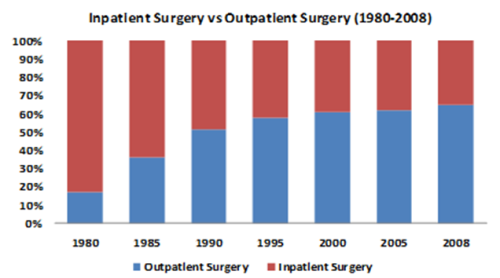Historically, surgical procedures were performed within the four walls of a hospital. However, the past decade has seen a dramatic rise in surgery volume being performed in an outpatient setting—largely ambulatory surgery centers (ASCs). As seen below, the number of U.S. ASCs is approaching 6,000, and overall procedure volume has shifted dramatically from inpatient to an outpatient setting.
Historically, surgical procedures were performed within the four walls of a hospital. However, the past decade has seen a dramatic rise in surgery volume being performed in an outpatient setting—largely ambulatory surgery centers (ASCs). As seen below, the number of U.S. ASCs is approaching 6,000, and overall procedure volume has shifted dramatically from inpatient to an outpatient setting.
Source: VMG Intellimarker 2011 and 2010
ASCs are outpatient facilities at which surgical procedures are performed on patients who do not require an overnight stay. ASCs were originally established in 1970 and most commonly perform elective procedures with short anesthesia and operating times. Typical procedures include eye, orthopedic, hand, plastic surgery, pain management, podiatry, ear-nose-and-throat, endoscopy, and laparoscopy at facilities usually ‘free-standing’ (not part of a hospital campus). ASCs operate within a highly regulated industry with each facility being required to comply with rigorous oversight and certification. Many of the same standards, constraints and requirements as inpatient hospital operating rooms apply to ASCs.
ASCs receive less of their total payments from Medicare/Medicaid than an average hospital – 37% for ASCs vs 61% for an average hospital which reduces some of the reimbursement pressure. This makes sense as most of the procedures performed in this setting are elective in nature, which tend to come from the population not utilizing government health benefits. We’ve assessed three key advantages offered by with the ASC approach to care:
- Compelling economics: ASCs are able to provide lower-priced procedures because they have a lower cost structure than a traditional hospital setting along with a “focused factory” approach which creates efficiencies.
- By shifting just half of all eligible outpatient surgeries to the ASC setting, Medicare could save an additional $2.3 billion annually (Ambulatory Surgery Center Advocacy Committee, 2010)
- Consumer appeal: ASCs are generally free standing and located in the suburbs, which provide patients with better access. Also, ASC schedules are better maintained because there is no possibility of emergency surgeries preempting a scheduled procedure.
- Focus, specialization and quality: It’s difficult to track the quality of care provided in ASCs compared to hospitals because ASCs are not yet required to report comparable outcomes data – which will likely change in the near future. We do know, however, that ASCs focus on a select number of procedures at a high volume, which allows doctors to perfect their craft and deliver high quality results to patients.
The advantages are not only for patients, but also for payers and providers. Payers are able to negotiate more favorable rates for procedures performed in the ASC which lowers their overall costs of care. Providers which are part of the ASCs have seen large economic gains as they’re able to take economic stakes in the operations. Overall, ASCs have grown to become an important part of the care delivery landscape and as the three advantages listed above might dictate, this an area we predict will have an increasing relevance in the healthcare landscape.
Let me know what you think.
Judd Stevens
![]() Judd Stevens is an associate at TripleTree covering the healthcare industry, specializing in the impacts and transformation of health plans in a post-reform world. Follow Judd on Twitter or e-mail him at jstevens@triple-tree.com.
Judd Stevens is an associate at TripleTree covering the healthcare industry, specializing in the impacts and transformation of health plans in a post-reform world. Follow Judd on Twitter or e-mail him at jstevens@triple-tree.com.








